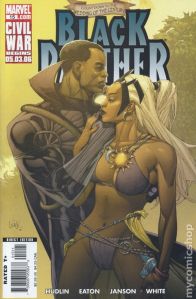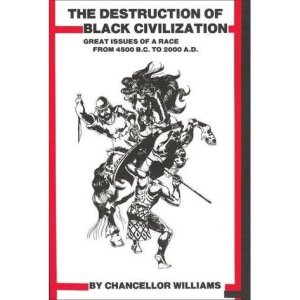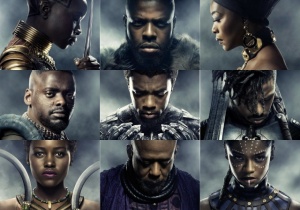I was in the mountains at a training retreat when Black Panther (2018) was released in theaters. So I only glimpsed the initial reviews during intermittent breaks in my program. My consolation was that in the thin crisp mountain air, I had time to work with brilliant leaders of color and reflect on my leadership strengths. It was just a movie, I told myself. I could geek out on getting to root causes of social problems in the Inland Empire, drawing on the historical context of the rise of the nation state and white supremacy. As an anti-racism educator I draw upon my strength of historical context, as well as my others strengths in strategy, learning, input, and connection to dream, plan, and build a multi faith multiracial world that could be. I have done that since I was a child, first with a notebook and colored pencils, then with a typewriter, a word processor, a desktop, then a laptop. I used those skills to dream, plan, and build imaginary worlds. Science fiction and fantasy writers often created worlds where someone like me would never exist. I sketched and wrote to create my own stories with characters who were idealized versions of people who looked like my multi-hued family. Watching Black Panther, felt like a long awaited home coming. It was an epic, a fantasy, an Afro-futuristic world that gave life to my unrealized dreams.

Image source: https://www.mycomicshop.com/search?SeriesID=5611
Over the past two weeks, I had to swallow a lot of envy as I couldn’t get away from work or obligations to find time to watch the film. Meanwhile, my timeline lit up with my friends and associates seated on Wakandan thrones, going in large groups and decked out in their finest traditional and African inspired clothing. I too had been waiting for some time. My interest in Black Panther came largely through the first Black woman superhero, Storm. I came to know her through the X-men cartoons. In the cartoon, she was beautiful, powerful, magical, cold, and aloof. She was also cut off from her culture. She was always alone. Who loved the gorgeous and powerful Storm? Who loves the magical black girls, the darkly hued warrior women? Over a decade ago, I walked into a comic book store and the cover art answered my question. It was Black Panther. I didn’t know much about him. But rendering of the marriage of Storm and Black Panther took my breath away. A decade later I became reacquainted as Prince T’Challa appeared with his female bodyguards in Marvel’s Civil War. Ta-Nehisi Coates, who was on twitter at the time, announced that he was writing the series. Acclaimed author Roxanne Gay wrote the Worlds of Wakanda spin off series. Even though it was a big deal, I had no idea how big it would get.

Chancellor Williams didn’t pull any punches
Nor did I realize how profound Black Panther would be for me. As a child, I was fed the National Geographic gaze of Africans and I was ashamed of my own history. It wasn’t until I went to high school, and began reading Black nationalist, Pan-African, and revolutionary writings that I started to gain a sense of self, my own history and pride in my roots. Some of the first books I read right after I graduated high school set my journey to become Muslim. The most significant books were Chancellor William’s The Destruction of Black Civilization: Great Issues of a Race Between 4500 B.C. and 2000 A.D. and the FBI files of Malcolm X. Becoming Muslim at 18 was not just a leap to faith, it was a leap to embracing my full identity as a daughter of the African Diaspora. My study of Muslims and the pre-modern world gave me a glimpse of what cosmopolitanism could look like outside of white supremacy. As a young person who newly became Muslim, I dove into medieval Arabic literature. I found texts and historical accounts that countered the egalitarian message that I embraced when I became Muslim. When I transferred to a four year college in 1998, I embarked on a long journey to understand racial formation in Muslim societies, Islam in Africa, and Black identities in the Middle East. Because they didn’t need written language, outside the Arabic literature in sub-Saharan Africa, we don’t have many written accounts of African societies without slave raiding or under threat from a foreign hegemony.
The Black Panther film was so rich for me, as a child of Diaspora and a scholar of African history. Africanists often do thought experiments to imagine what could be. Walter Rodney inspired us deeply to think about the underdevelopment. What if whole regions weren’t depopulated as sons and daughters weren’t carried off? What if the railways were built to connect African cities, rather than export raw resources to Europe, Asia, and the Americas? What if mass deaths didn’t occur and Africa was allowed to develop without the influence of colonialism and now neoliberal policies? What if toxic strains of foreign ideologies hadn’t bred internalized racism and dehumanization of other tribes, faiths, or nations?
All of this is some heady stuff for an action film. So many Black women intellectuals have written amazing pieces, such as “Black women ‘never freeze’” by Dara Mathis there is even a #BlackPantherSyllabus and #WakandanSyllabus. During this cultural moment, while Black folks globally are having deep discussions and more petty debates about who has a right to wear daishikis, some of my co-religionists take umbrage to a 2 minute scene involving Boko Haram and called the film Islamophobic. It is akin to the derailing of the viral #BringBackOurGirls campaign, where some Middle East activists used the hashtag to critique Michelle Obama. Sadly, this week Boko Haram has kidnapped a dozen school girls. While I’m basking in Vanta Blackness, I don’t want my celebration to be derailed. So I’ll save my discourse analysis for another day. But I hope that the film raises awareness to drum up support for African led initiatives to combat Boko Haram. If only there was a Nakia to help bring those girls home. In the meantime, more of you can spend time learning about African history, reading African literature, and uprooting the anti-Black racism that your communities have been complicit in. We should also be more open to the deeper messages in the film and focus our energies on that. A visionary place like Wakanda can show us that the Black imagination is key for collective liberation.
Some Good Reads
Panther: an A-Z of African Nuggets
Is Black Panther Islamophobic? A Somali Canadian Perspective



 Occasionally, I will get a request from someone I never met, but they are a friend of a friend on facebook or they follow my blog. Ignoring a request isn’t a personal thing, but in a way it is. But not in the sense that I don’t like you or you’re a bad person, or you’re unimportant. I just don’t know you, even though some of you may think you know me. You only know some of my thoughts, personal reflections, and tendency towards typos and bad grammar. Maybe you get my humor or maybe you don’t. Perhaps we have shared interests or similar views, but we don’t have a personal connection. Most of us haven’t had an extended exchange for me to feel much of resonance. I just don’t want you to think I’m giving you the cold shoulder. It’s nothing personal, but following my blog isn’t enough for me to allow someone access to more details about my life, so that I can be known without a person truly knowing me. We have to have some type of professional, personal, or or academic relationship before I add you my facebook friends or give you my personal contact.
Occasionally, I will get a request from someone I never met, but they are a friend of a friend on facebook or they follow my blog. Ignoring a request isn’t a personal thing, but in a way it is. But not in the sense that I don’t like you or you’re a bad person, or you’re unimportant. I just don’t know you, even though some of you may think you know me. You only know some of my thoughts, personal reflections, and tendency towards typos and bad grammar. Maybe you get my humor or maybe you don’t. Perhaps we have shared interests or similar views, but we don’t have a personal connection. Most of us haven’t had an extended exchange for me to feel much of resonance. I just don’t want you to think I’m giving you the cold shoulder. It’s nothing personal, but following my blog isn’t enough for me to allow someone access to more details about my life, so that I can be known without a person truly knowing me. We have to have some type of professional, personal, or or academic relationship before I add you my facebook friends or give you my personal contact.